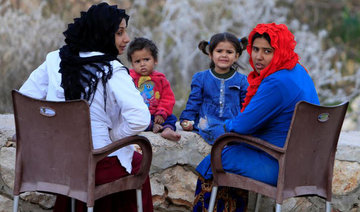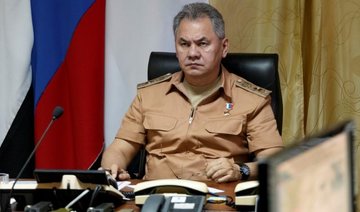GENEVA: Medical evacuations have begun from the Syrian rebel-held enclave of Eastern Ghouta to Damascus, the International Committee of the Red Cross in Syria said early on Wednesday.
Almost 400,000 people in Eastern Ghouta are besieged by forces loyal to President Bashar Assad, and the United Nations has pleaded for his government to allow evacuation of around 500 patients, including children with cancer.
The Syrian American Medical Society (SAMS) said four patients were taken to hospitals in Damascus, the first of 29 critical cases approved for medical evacuation, and the remainder would be evacuated over the coming days.
SAMS advocacy manager Mohamad Katoub said in a tweet that five had been approved for the first group of evacuations, part of a deal on an exchange of detainees between Assad’s government and rebel group Jaish Al-Islam. It was not clear why only four of the five had left.
The Syrian Red Crescent said the evacuations were the result of “long negotiations.” An ICRC spokeswoman declined to give more details, citing the sensitivity of the operation.
On Sunday, Turkish President Tayyip Erdogan said Turkey was working with Russia, Assad’s ally, on the evacuations.
Last week Jan Egeland, the United Nations humanitarian adviser for Syria, said 494 people were on the priority list for medical evacuations.
“That number is going down, not because we are evacuating people but because they are dying,” he said. “We have tried now every single week for many months to get medical evacuations out, and food and other supplies in.”
The United Nations has been waiting for months for the Syrian authorities to provide “facilitation letters” to allow the aid operation to get under way.
Forces loyal to Assad have carried out air raids on Eastern Ghouta, while besieged rebels have fired mortars into neighboring Damascus.
“That has nothing to do with the right of evacuating, and obligation to evacuate civilians (and) wounded,” Egeland said.
Medical evacuations begin from Syria’s Eastern Ghouta -ICRC
Medical evacuations begin from Syria’s Eastern Ghouta -ICRC

Qassim National Park records birth of Arabian oryx for third successive year

- National Center for Wildlife seeks to preserve endangered species, enhance biodiversity
RIYADH: Qassim National Park in Buraidah has recorded the birth of an Arabian oryx for the third successive year, marking an important environmental milestone and reflecting the ongoing success of the release and reintroduction programs initiated by the National Center for Wildlife.
The NCW seeks to preserve endangered species and enhance the biodiversity of their natural habitats, the Saudi Press Agency reported.
The achievement is a success for the pioneering collaboration between the NCW and the National Center for Vegetation Cover Development and Combating Desertification through initiatives such as vegetation enhancement, natural habitat rehabilitation, and the creation of suitable conditions for the breeding and sustainability of wild species.
Qassim National Park is one of several national parks implementing afforestation and environmental rehabilitation projects under the Saudi Green Initiative, strengthening the region’s ecological diversity and showcasing the role of national parks as models of successful environmental sustainability programs in the Kingdom.
Saudi Arabia is a global leader in protecting the Arabian oryx. Since the 1970s it has collaborated with international organizations to save the species from extinction.
The Arabian oryx, which belongs to the bovine family, is classified as an endangered species and the resettlement programs for such threatened animals reflect commitment to working to support ecological balance, enriching biodiversity, and preserving species whose numbers have declined due to environmental factors and loss of vegetation cover.














